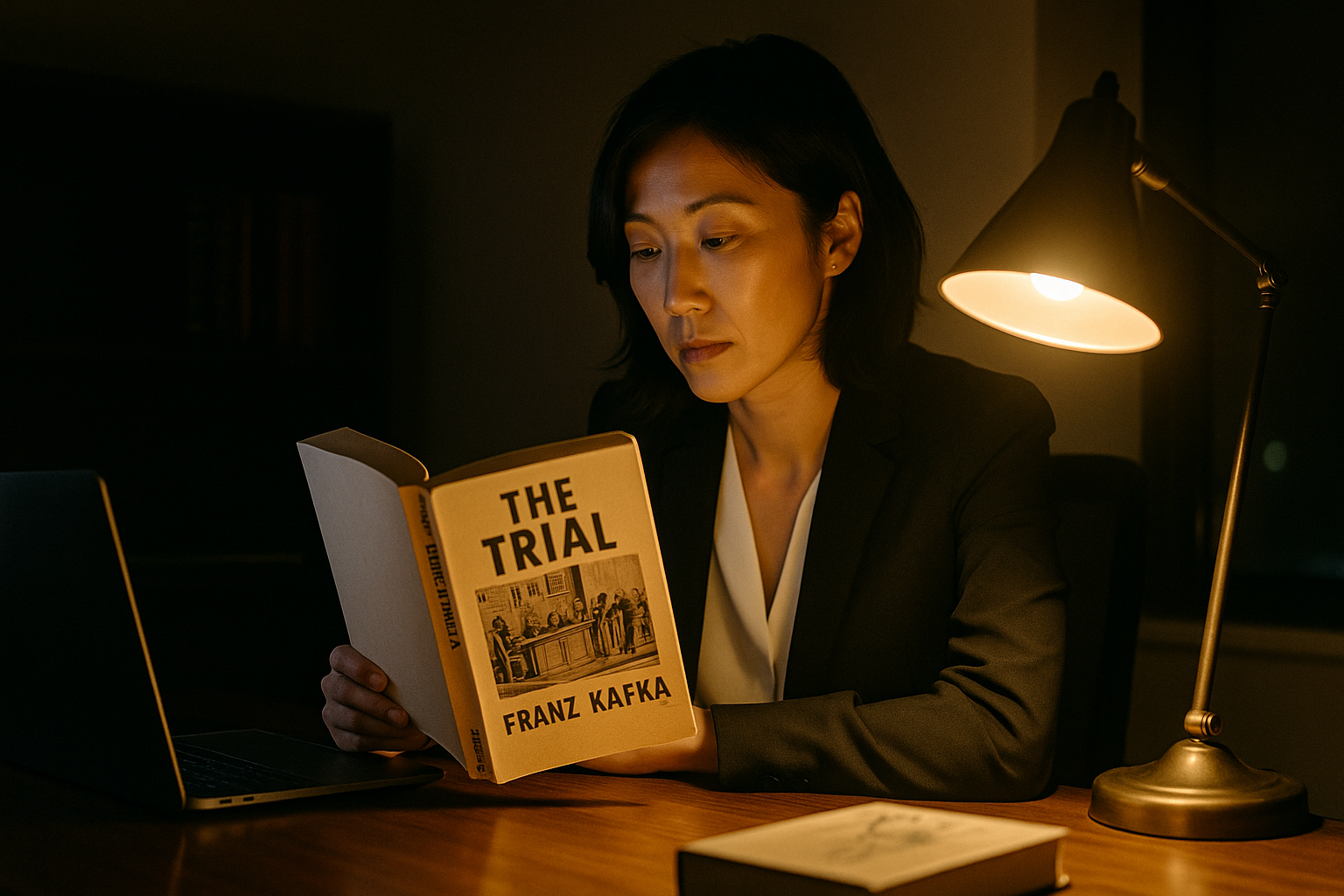Absurdity and Alienation: The Echo of Modern Existence
Immerse yourself in Franz Kafka’s “The Trial”, a captivating novel that explores the themes of absurdity, justice and isolation through the story of a man confronted by an opaque judicial system. An essential work for understanding the modern human condition.
Introduction
“The Trial”, written by Franz Kafka between 1914 and 1915 and published posthumously in 1925, is one of the most famous and enigmatic works of modern literature. The novel tells the story of Josef K., a banker who suddenly and inexplicably finds himself accused of an unspecified crime. Through the bureaucratic and judicial labyrinth in which Josef K. tries to navigate, Kafka explores themes of alienation, guilt and existential absurdity. The work is a twentieth-century masterpiece, reflecting the anxieties and uncertainties of the modern age.
Summary and structure
The novel opens with the arrest of Josef K., who, although accused, remains free to move about and continue his daily life while awaiting trial. The plot follows his desperate attempts to understand the nature of the charge against him, and to defend himself in an opaque and labyrinthine legal system. The novel’s structure, marked by chapters that at times seem discontinuous, reflects the chaos and confusion with which Josef K. is confronted, plunging the reader into a quintessentially Kafkaesque experience.
Themes and analysis
“The Trial” is rich in themes and symbols, including the absurdity of the human condition, the fruitless quest for justice and existential loneliness. Kafka depicts a dehumanized bureaucratic world, where the individual finds himself trapped in an inextricable web of incomprehensible laws and procedures. The work questions the notion of intrinsic guilt and the overwhelming desire to find meaning in a seemingly arbitrary and indifferent universe. Josef K.’s struggle against an impenetrable legal system becomes a metaphor for the human quest for authenticity and freedom in a world that seems to lack them.
Characters and development
Josef K., the protagonist, is a complex character whose quest for justice and understanding is hindered at every turn. The other characters, such as the lawyer Huld, the painter Titorelli, and the priest, are both enigmatic and symbolic, representing various aspects of the justice system and society. These characters contribute to the novel’s oppressive atmosphere, and reflect the different facets of Josef K.’s struggle to assert his innocence and his own humanity.
Impact and reception
On its posthumous publication, “The Trial” was recognized as a major work of modern literature, profoundly influencing existentialist and postmodern thought. The term “Kafkaesque”, derived from Kafka’s work, is now used to describe absurd, oppressive situations similar to those experienced by Josef K. The novel continues to resonate with contemporary readers, offering a penetrating critique of power structures and the human condition.
Why read this book?
“The Trial” is essential reading for anyone interested in exploring the themes of absurdity, justice, and isolation in literature. It offers a profound reflection on the human experience in the face of impersonal systems of power and the quest for meaning in a world where reason often seems absent. The novel’s ability to evoke existential anguish and question the nature of guilt and freedom makes it a timeless and universally relevant work.
Conclusion
With “The Trial”, Kafka created a powerful allegory of modern alienation, an exploration of loneliness and disorientation in a world governed by incomprehensible forces. The novel remains a cornerstone of world literature, inviting ongoing reflection on the moral and existential dilemmas of the individual in contemporary society.
Latest Reviews & Analyses
Stay Updated with Our Latest Reviews
Join our community to receive exclusive insights and updates on groundbreaking literary works.
Find Your Next Literary Adventure
What Our Readers Are Saying

Alex Jonhson
“A treasure trove of insights and critiques that deepened my appreciation for classic and contemporary works alike.”






